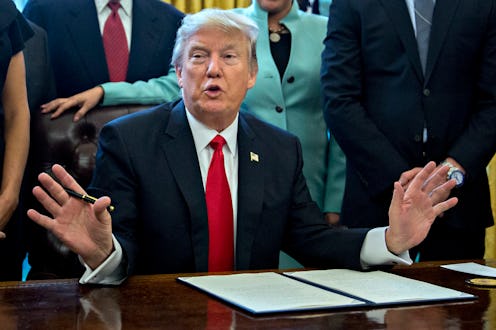
After Donald Trump's initial travel ban executive order led to a series of protests and was ultimately blocked by the courts, the president signed a new travel ban order on Monday with a few modifications. While it still targets Muslims-majority countries, the new travel ban will not be effective immediately, White House adviser Kellyanne Conway said Monday. Instead, it will go into effect on March 16, to prevent what another senior White House official referred to as the "disruptions" and "havoc" that followed the last executive order's implementation.
When Trump signed the last order — which named Iraq, Iran, Libya, Somalia, Sudan, Syria, and Yemen — many people were essentially left in limbo. Green card holders were unsure of how they would be affected by the travel ban. Some refugees who were already in transit, or had been approved to enter the United States, were turned away. Protesters flocked to airports around the country to protest the travel ban and to demand that immigrants and refugees be admitted.
It is for these reasons that the executive order will not be effective until March 16. This time around, according to Conway, Iraq is no longer on the list of countries targeted by the ban, and legal permanent residents — also known as green card holders — will reportedly not be affected.
"If you have travel docs, if you actually have a visa, if you are a legal permanent resident, you are not covered under this particular executive action," Conway said. "Also, Iraq is no longer on the list based on their enhanced screening and reporting measures."
The new travel ban executive order, entitled "Executive Order Protecting The Nation From Foreign Terrorist Entry Into The United States," suspends all refugee admissions into the U.S. for 120 days — a change from the old order, which banned Syrian refugees indefinitely. Like the old executive order, however, the new travel ban puts a 90-day hold on visa processing for travelers from the six countries on the list, according to The New York Times.
Despite the fact that the countries named in the new travel ban are Muslim-majority countries, a senior Homeland Security official told Politico that “this is not a Muslim ban in any way, shape or form." DHS officials also said that the FBI is currently investigating 300 individuals who were allegedly admitted to the U.S. refugees, on the basis of terrorism. However, Politico reported that officials did not specify if these individuals came from the countries named by the travel ban.
Officials hope that the ten-day delay in the implementation of this new travel ban will lead to smoother rollout of the policy, even though the Trump administration previously argued that delaying the implementation of the ban could pose a national security risk.
“You should not see any chaos, so to speak, or alleged chaos, at airports,” the DHS official told Politico. “There aren’t going to be folks stopped tonight from coming into the country pursuant to this executive order."